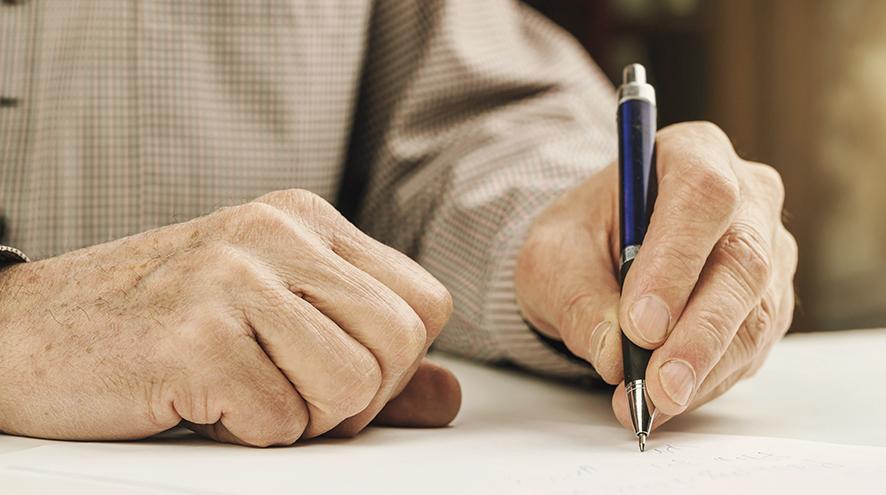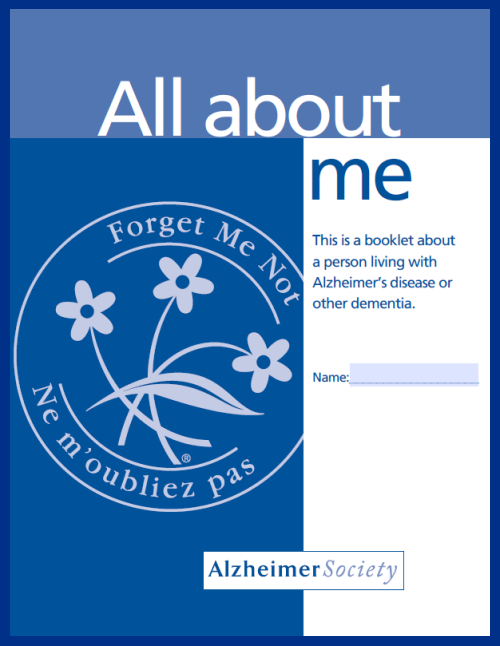Helpful routines and reminders
Memory changes can be difficult to cope with and frustrating. However, there are strategies that you can use to help you stay independent for as long as possible.

The information on this page is also available in print-friendly PDFs:
- Download Memory Tips & Tricks
- Download the full All about me booklet
- Download All about me – a conversation starter
- Download The Story is Mine (A’tukawaqnm). Created with the guidance and support of Mi'maw people and communities in Nova Scotia.
You can also contact your Society for copies.
Memory aids and tools
Post-it notes
- Post-it notes are a great way to write down reminders as needed or as you think of them.
- Put the post-it note in a place where you know to look (such as on the bathroom mirror) and take the note down once you have done what the note says, to prevent you from doing it twice and to avoid confusion.
Whiteboards
- Dry/erasable whiteboards are another great tool to help you remember things. Whiteboards come in a number of different sizes that can be hung on a wall.
- You can also find magnetic whiteboards that can be put on the fridge.
- Be sure to update the information on the whiteboard as you complete each task.
- Whiteboards can be purchased at most stationary stores.
Oven timers
- Almost all ovens have a timer, and if yours doesn’t, you can buy one at many department or hardware stores.
- Timers can help you remember to turn off your stove or oven once your meal is ready to eat.
- Timers can also be helpful when you are doing laundry and want a reminder that it is time to check if the laundry is ready.
- Lastly, you can use your oven timer to help you bridge a memory from a reminder earlier in the day. For example, if you have an appointment at 11:00 am, and you need to leave the house by 10:30 am to be on time, you can set a timer to go off half an hour before you need to leave your house to help you remember that you need to get ready.
Emergency lists
- An emergency may happen, and you may need to go to the hospital unexpectedly. To help you provide the hospital staff with detailed information about your healthcare needs, consider filling out the Alzheimer Society’s “Be Ready for an Emergency Department Visit” forms.
- The forms will help you communicate your needs, making it possible for hospital staff to provide more personalized care.
- It may also be helpful to create a list with emergency phone numbers (such as the fire department and the number of your emergency contacts). Put this list in an easy-to-access place, such as on your fridge.
Computer and smartphone calendars
- Online calendars have options for pop-up reminders for any of the events that you have added to your calendar, such as medical appointments or social engagements.
- Similarly, many cellular phones have a calendar application in which you can add reminders for future appointments and social gatherings.
- For example: You have added to your calendar that you have a doctor’s appointment on June 29th. The pop-up reminder will remind you of this the day before your appointment and 15 minutes before the appointment.
Sticky notes
- Sticky notes are virtual post-it notes that sit on your computer screen.
- Many computers have a “sticky note” feature.
- Every time you add a sticky note, they will appear on your computer screen when you turn on your computer.
- Sticky notes can be edited at any time and you can have as many sticky notes as you wish.
- Try to keep the information on the sticky notes current and up-to-date to avoid any confusion.
- Similarly, many cellular phones also come with a sticky note feature.
Medication reminders
Leave your medications in plain view
- Leave your medications in a place you frequent, or a place that will act as a visual reminder for you to take them.
- For example, if you make coffee in the morning, leave your morning medications by the coffee machine. If you live with children, or if you have children visiting frequently, put the medications in a place where they cannot reach them.
Pill containers
- Pill containers come in different sizes and have compartments for each day of the week and for different times throughout the day.
- For example, a container may have compartments for pills to be taken in the morning and a separate compartment for pills to be taken in the evening.
- Other pill containers may have more options (morning, afternoon, evening) that may better serve your needs.
- Pill containers are available at almost any pharmacy or major shopping chain stores.
Benefit: Pill containers make it easy to track that you are taking the proper medication at the appropriate time and in safe dosages.
Blister packs
- This is a pre-packaged dispenser for medications that is made up by your pharmacist, and it is usually free of charge.
- Consider keeping an empty blister pack or pill container on your bathroom counter.
- The empty blister pack or pill container can act as a visual reminder to take your medications.
Benefit: By having someone else pre-arrange your medications into a container, you eliminate possible confusion of when a medication should be taken. Blister packs also make it easier to track that you are taking the proper medication at the appropriate time and in safe dosages.
Calendar
- Hang a calendar where you keep your medications.
- Use the calendar to mark down the time and day you took your medication. Be sure to do this as soon as you take the medication. Do not wait until later to mark this on your calendar.
- If the medication is taken more than once a day, repeat the process.
Benefit: If you forget if the medication has been taken, or if the medication is taken out of the pill container or blister pack by mistake, the calendar will help you check if you have taken the medication and the time it was taken. Marking up your calendar can also reduce the risk of taking the medication twice.
Alarms
- Consider setting alarms throughout the day to remind you to take your medications.
- For example, you can use a cell phone to set multiple alarms throughout the day for different medications that you may be taking.
Day to day memory strategies
Visual cues
Visual cues can be very helpful for remembering things. For example:
- Hanging a backpack on your door handle can serve as a reminder to take it with you when you leave your home.
- Leaving a slow cooker or a bread maker on the counter will remind you that you want to prepare a meal or make bread.
- Putting your laundry hamper in your living room will remind you that you need to do laundry.
Your imagination is the only limit on how you can use visual cues to help you remember things!
Notebook and pen
- Consider carrying a notebook and pen with you. Having a notebook available will help you write things down as needed, so you don’t forget to do them later.
- Try to keep the information in your notebook current and remove notes of things you have already done (such as calling a friend) to prevent you from doing it twice and to avoid confusion.
Write it down
- Consider writing down tasks that you need to get done, such as writing down that you need to buy fresh flowers.
- Even if you think you will remember what needs to get done, writing it down will make it easier for you to verify that you have done all the tasks that need to get done.
- Once you have completed the task, discard the note to avoid confusion.
- Because you may forget that you have a note or a list in your pocket, you may also find it useful to write notes on your hand, such as a list of items you need to buy at the grocery store. Because your hands are always visible, having a note written on your hand will make the note more accessible.
Consider taking detailed notes of your conversations with other people
- After having a conversation with someone, such as a close friend or a family member, consider writing down detailed information of what the discussion was about.
- For example: A friend offers to go to the movies with you and gives you their phone number for you to call them to let them know when you are available. To help you remember this conversation, write down your friend’s phone number, their name, that they offered to go to the movies with you, the date and that they are waiting for you to call them to give them your availability.
- Try and write this down shortly after your conversation so that the information is accurate.
- Writing detailed information will help you remember what the conversation was about, with whom and if you need to follow up on something.
- If you need to follow up on something, use another memory aid to help you remember to do this when you get home.
Keep belongings in one place
- Although this may not be an easy thing to do, making the effort of keeping your belongings in one place may save you time looking for them and may reduce confusion.
- For example, keep your most used cooking utensils in one drawer and put your reading glasses on your night table when you are done using them.
Have duplicates of items you use often
- Consider purchasing duplicates of items you use often, such as toothbrushes, nail clippers, reading glasses and watches.
- When you have duplicates of an item it will make it easier to find one if you misplace it.
Flag emails
- Flag all emails that need a follow-up.
- Go through your flagged emails once a week to make sure you have followed up on them.
- Once you are done replying to an email, delete it.
Ask for a reminder
- If you are living with a partner, family member, or socialize with friends and work colleagues, don’t be afraid to ask them for reminders.
- If the person knows you have memory issues, they are often more than happy to help you out.
- Keep in mind that they may also forget to remind you of something, such as taking a medication, so consider using more than one memory aid to help you remember.
All about me: A resource to help you remember
Why use All about me?
As your dementia progresses and it becomes more difficult to manage the changes in your abilities, it's important that you record the things that make you who the person you are.
All about me is a booklet that can help you tell others about yourself. Through All about me, you can focus on the positive: What you are good at, rather than what is no longer possible.
After all, you know what makes you feel comfortable better than anyone. By answering the questions in this booklet, you will have a record of what makes you content and at ease.
This will especially be helpful as your dementia progresses, as this booklet can be used when your primary caregiver cannot be with you and others need to provide care and support. Anyone can use this booklet to help you live the best day possible now and as the disease progresses.
An editable PDF version of All about me is available for download, which allows you to type your information directly into the document.
A fillable booklet to help professional caregivers get to know people living with dementia better.

The Story is Mine
Adapted from All about me and created with the guidance and support of Mi'maw people and communities in Nova Scotia.
Download The Story is Mine (A’tukawaqnm).
All about me – a conversation starter
Sometimes all people need is a “snapshot” of you in order to start a conversation. At just three pages long, All about me – a conversation starter is a shorter booklet that focuses on your needs, likes, dislikes and interests.
Download All about me – a conversation starter
Whether you're completing the full booklet or the conversation starter, always keep in mind the main purpose: To give as clear a picture as possible of you. This will help others provide care when you, and others who support you, are unable to.
How to use these booklets
- Once you have opened the document, go to “File” and select “Save as” to save it on your computer. This will allow you to continue adding and editing information.
- To write directly in the PDF, use the cursor to click on a section with lines. This will open a text box where you can type in your answer.
- Once you've finished filling in your information, we recommend printing the booklet out (Note: the full booklet is 28 pages). Then you can take it with you wherever you go, and use it to talk to whomever you meet.
- If you need help, just contact us. We also have printed copies we can send to you.

Acknowledgements
The information found on this page could not have been written without the contribution, guidance and support of Roger Marple (pictured), who lived with Alzheimer's disease.
Appreciation is also extended to members of the Alzheimer Society of Canada Advisory Group of people living with dementia: Marilyn Taylor, Mario Gregorio and Gordon Grant.
More useful links and resources
Memory tips & tricks. Alzheimer Society of Canada. An information sheet for strategies to help people with mild memory problems, based on ideas and suggestions provided by people living with memory loss.
All about me. Alzheimer Society of Canada. A booklet designed for people living with dementia to help them create a record of their background and what is important to them.
All about me – A conversation starter. Alzheimer Society of Canada. A shorter tool that provides a “snapshot” of the person in order to start a conversation
Shared experiences: Suggestions for living well with Alzheimer’s disease. Alzheimer Society of Canada. This booklet, informed by the real experiences and advice of Canadians living with Alzheimer's disease, can help answer common questions and concerns about living with Alzheimer's.
All About Me: Person-Centred Care. brainXchange, March 2014. This webinar discusses the importance of person-centred care and how the All about me booklet can help caregivers support the person with dementia through the continuum of the disease. Presented by Christene Gordon, Director of Client Services and Programs for the Alzheimer Society of Alberta and Northwest Territories.
Memory Work Out: A "By Us For Us" Guide. Research Institute for Aging. A guide with examples of cognitive exercises to help people with dementia develop and maintain regular “workouts” for their brain.
